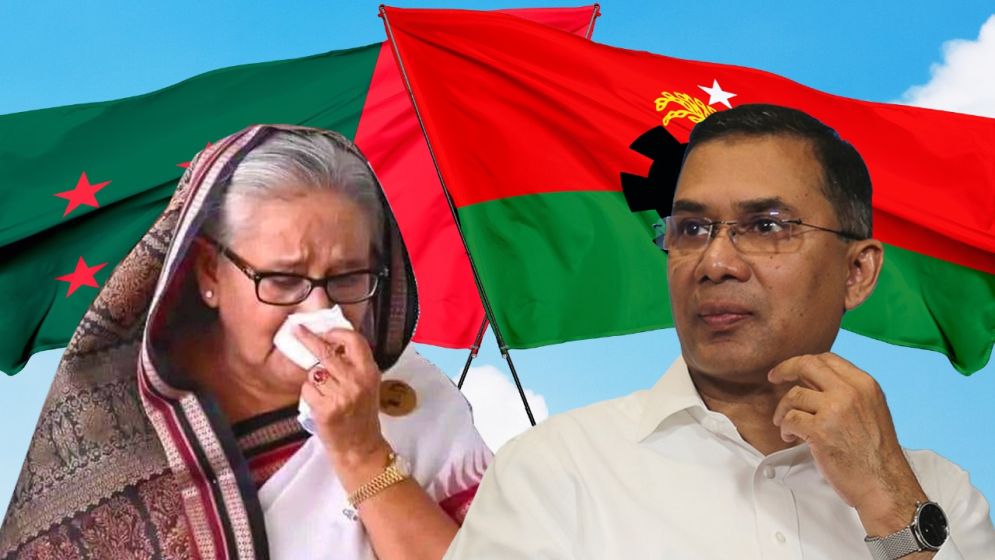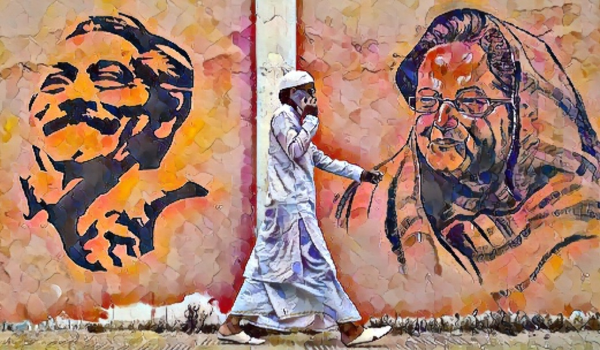Awami League’s wake-up call: BNP is the essential ally it needs to do politics, but not in Hasina’s way

I find it perplexing that Awami League supporters have never grasped this point—and, in fact, they’ve never even attempted to! Even if some are trying to understand it now, it’s likely they’ll forget after the first attempt.
For the past 16 years, Sheikh Hasina has spared no effort in trying to dismantle the BNP. Every day, at every turn, the Awami League has vilified the BNP, viewing them as a constant threat.
They’ve gone to great lengths to erase Ziaur Rahman’s legacy, even demolishing the 40-year-old residence on Shaheed Moinul Road where Begum Khaleda Zia had resided since Ziaur Rahman’s assassination.
But the truth is, in Bangladeshi politics, for both stability and healthy democratic governance, the BNP is the Awami League’s greatest ally.
If the Awami League genuinely wants to preserve the democratic ideals of independence and build a prosperous, middle-income Bangladesh, the BNP is their best partner.
Other forces have either tried to destroy the Awami League or used it as a tool to transform Bangladesh into a satellite state of India.
One of the major issues with the Sheikh family and the Awami League is their "fascist DNA." Whenever they’ve held power, they’ve turned the country into a one-party, authoritarian state.
This has ultimately led to their downfall, first in 1975 and now again in 2024. This kind of backlash has only occurred with Jamaat-e-Islami, and not with any other political party.
The Awami League must remember that their 1975 experiment with BAKSAL-style fascism nearly led to their complete destruction.
It was only through Ziaur Rahman’s active intervention that the Awami League was able to regroup.
Without Ziaur Rahman or the BNP, and without the rehabilitation of the Awami League as a major opposition force under Zia’s leadership, the country would have either fallen into the hands of ultra-communist ideologies like Colonel Abu Taher or into a Pakistan-confederation model under figures such as former Air Vice Marshal Muhammad Ghulam Tawab and Colonel Sayed Farooq Rahman.
The Bangladesh we know today would not exist—it would have become either a piracy-ridden Somalia-like state in the Bay of Bengal or an Afghanistan-style extremist regime.

BNP as a stabilizing force
Now, in 2024, history is repeating itself. The Awami League has once again been ousted by public outrage over its authoritarianism.
As in 1975, it is once again the BNP working tirelessly to keep Bangladesh as a moderate, democratic state. And, just as in the past, if the Awami League is rehabilitated, it will be thanks to the BNP’s efforts.
The successors of figures like Air Vice Marshal Tawab are now trying to steer the country down a Taliban-like path, inciting extremism daily and fostering chaos.
From encouraging anarchy with slogans like “burn this,” “destroy that,” and “lynch him,” to divisive acts like cow slaughter and banning dissent, their agenda is clear.
If the BNP hadn’t intervened politically to stabilize the country and support the interim government, Bangladesh would have plunged into complete disorder.
Who understands this better than the Awami League? For political gain and to destroy the BNP, they have repeatedly blamed the August 21 grenade attack on the BNP and Tarique Rahman.
Yet, they know full well that the attack was orchestrated and carried out by fringe elements of extremist groups, such as Ansar al-Bangla and Mufti Hannan.
In 1975, it was leaders such as Ziaur Rahman, Mashiur Rahman Jadu Mia, and Justice Abdus Sattar who managed to control extremist pressures, stabilize the nation, and rehabilitate the Awami League as the leading opposition party.
Similarly, it seems likely that in 2024–2025, under figures like Tarique Rahman and Mirza Fakhrul Islam Alamgir, the Awami League may once again emerge as an opposition force.
However, their future role will be determined by the Awami League’s own choices. The Sheikh family’s political fate seems sealed, and the party will need to reorganize under new leadership to make a comeback.
The Awami League still enjoys at least 20% support among the population aged 50 and above. However, unless they engage positively with the younger generation and avoid stoking further unrest, their support could diminish.
Within two or three election cycles, they could face a fate similar to that of the Muslim League or Jatiya Party. A reformed Awami League must emerge based on principles of truth and reconciliation.

Why should the Awami League support the BNP?
There is no doubt that accountability of Awami League for the past 15 years of forced disappearances, extrajudicial killings, and other crimes must be ensured.
Those responsible should be expelled from the party, prosecuted, and punished under charges of crimes against humanity.
MPs elected through illegal means in recent terms should face disqualification for an equivalent number of terms, with those who served three consecutive illegal terms banned for the same period.
While many may be frustrated by the BNP’s history of extortion and dominance, it’s clear that this political force plays a crucial role in guarding against Islamist extremism and destabilizing forces.
Without the BNP’s stabilizing presence, anarchists would likely escalate from attacking media outlets like Prothom Alo to committing violence against minority groups, and ultimately target LGBTQ communities, the Ahmadiyya, and Shia Muslims.
The BNP remains a vital counterforce in this volatile political landscape.
Despite understanding the historical context, the current actions of the Awami League are in stark contrast to what should be done.
The party must avoid taking steps that could destabilize the country and embolden extremist forces.
However, instead of focusing on stability, they are engaging in minority-driven politics, inciting unrest through groups like Ansar League and the Village Electric Workers League, and further alienating the younger generation with their divisive strategies.
At this crucial moment, the Awami League should be quietly supporting the BNP and the interim government, aligning with new leadership in preparation for elections. Unfortunately, this is not happening.
I emphasize again: the BNP is the Awami League’s most important ally. If the interim government fails, it would only strengthen the Islamist factions bent on destroying the country.
In reality, the Awami League is only causing itself harm. They should abandon any illusions that India will intervene to resolve their issues.
For India, intervening in Bangladesh would be far riskier than intervening in Pakistan or China. With a shared land border, India cannot afford to let Bangladesh fall under the influence of China or Pakistan.
The Awami League needs to understand that instability will not benefit them. It is the BNP and the interim government that have been working tirelessly to protect the nation from extremists.
The Awami League must support them and unite behind new leadership, preparing for the upcoming elections. The BNP has taken significant risks to protect the Awami League’s political existence, and now is the time for the party to support the BNP in return.
_______
Rumi Ahmed is a Texas-based physician and writer with keen interest in Bangladesh politics

